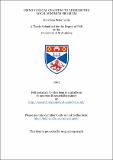Using subgoal chaining to address the local minimum problem
Abstract
A common problem in the area of non-linear function optimisation is that of not being able to guarantee finding the global optimum of the function in a feasible time especially when local optima exist. This problem applies to various areas of heuristic search. One of these areas concerns standard training techniques for feedforward neural networks. The element of heuristic search consists of attempting to find a neural weight state corresponding to the lowest training error. This problem may be termed the local minimum problem. The local minimum problem is addressed for feedforward neural networks. This is done by first establishing the conditions under which local minimum interference for the training process is to be expected. A target based approach to subgoal chaining in supervised learning is then investigated. This is a method to improve travel for neural networks by directing it more precisely through local subgoals than may be achieved through a more distant goal. It is shown however that linear subgoal chains are not sufficient to overcome the local minimum problem. Two novel training techniques are presented which use non-linear subgoal chains and are examined for their capability to address the local minimum problem. It is found that attempting to target a neural network to do something it cannot may lead to suboptimal training. It is also found that targeting a network to do something it is capable of generally leads to successful training. A novel system is presented which is designed to create optimal realisable targets for unrealisable goals. This allows neural networks to subsequently achieve the optimal weight state through a sufficiently powerful training method such as subgoal chaining. The results are shown to be consistent with the theoretical expectations.
Type
Thesis, PhD Doctor of Philosophy
Collections
Items in the St Andrews Research Repository are protected by copyright, with all rights reserved, unless otherwise indicated.

